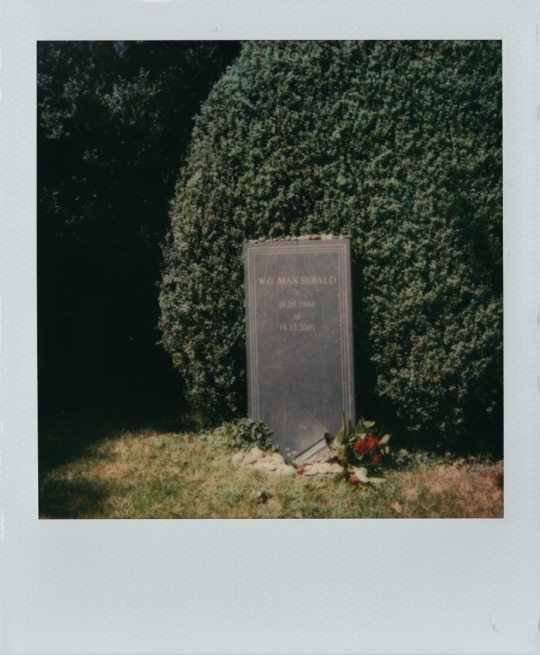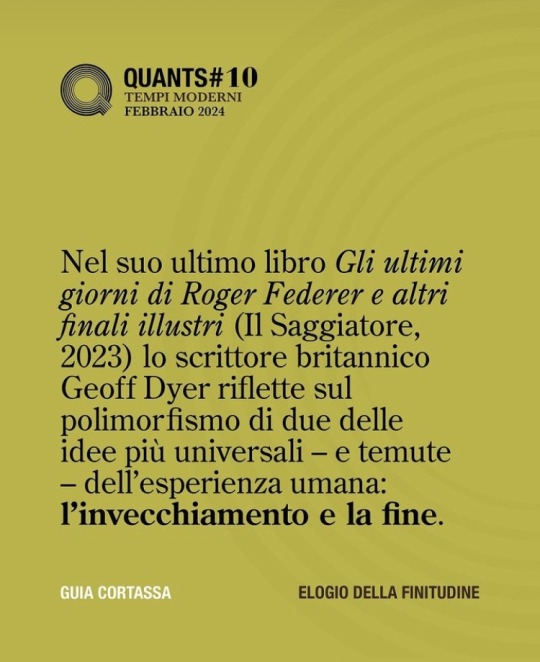#geoff dyer
Quote
So at some point I privately commit to doing a book, and let a certain amount of material accumulate. After a number of words have been amassed I can begin to relax—there will be a book—and from that point on, my need for discipline diminishes because there’s no need for it. Writing the book becomes all I want to do. The quantity of words increases and, simultaneously, some sense of form emerges, a form uniquely appropriate to the subject matter and growing directly out of the material. Great happiness ensues. It’s worth adding—because it’s something I'm grappling with at the moment, with a new book—that I failed to complete the tennis book partly because I let too much material accumulate without organizing it, and it became this swampy mess I could not find a way of navigating through.
Geoff Dyer, from “The essayist on not having a career”, Interview between Geoff Dyer and James Surowiecki, The Yale Review, December 6, 2022
14 notes
·
View notes
Text
NEW AT ECLECTICA this month - on the California writer Delicious Tacos.
The nom de plume of an almost certainly muscular straight white male domiciled in or around West Hollywood, Delicious Tacos (DT) made a spicy name for himself offering dating advice to frustrated gents on the capital-I Internet, the way Charles Bukowski made a name for himself doing the same for colicky bums in the stapled mags. Like Bukowski, DT delivers a dangerously lucid fictional version of his barbarous drunken self. A fiction the impressionable male reader, with an underdeveloped sense of context, dares to imitate in real life. Unlike Bukowski's Henry Chinaski, a child of the Great Depression, who, when he arrived in a new town, sought out the poor people section, the Delicious Tacos character, a child of the Reagan/Clinton boom, is a sloppy yet optimized knowledge worker: when DT arrives in a new town, he heads to the Capital One Café across the street from the CorePower, takes a seat at the Warrior 2 window, gets excited by the bubble butts, remembers porn ruined his sexuality, and fires up a new post....
2 notes
·
View notes
Text
'Before he became one of cinema’s most prolific actors, Cillian Murphy was all set for a music career. He even attracted an incredibly tempting recording contract but changed course at the last minute to pursue a career in the movie business instead. Now, he stands as one of the greatest actors of a generation, bringing a mosaic of weird and wonderful characters to life on screen, including Scarecrow in Christopher Nolan’s The Dark Knight trilogy and the more recent J. Robert Oppenheimer in Oppenheimer.
As someone who once said, “I’m less interested in the good man’s life, I’m more interested in the conflicted man’s life or the contradictory man’s life”, Murphy’s interest in books comes as no surprise – particularly as many of his favourites tackle subjects like the complexities of human existence. For example, he cites Appointment in Samarra by John O’Hara as one he regards highly after being drawn into “the atmosphere and pressure of what it must have been like to be alive in America at that time”.
Similarly, John Healy’s The Grass Arena makes the cut for the power held over Murphy, who decided to read the book after years of recommendations. “It is the story of determination and rebirth,” Murphy says. “The tale of a chess champion who overcomes a savage childhood to live again. A powerful book indeed”.
One of the more heartbreaking works comes with Patrick McGabe’s The Butcher Boy, which details the story of a young boy who descends upon a fantasy world to escape from his troubling home life. For Murphy, the book left a lasting impression on account of its ability to blend a series of dichotomous emotions: “[It’s] dark, fiercely funny, compassionate, and unashamedly Irish. Its depiction of a young boy’s descent into isolation and madness in small-town Ireland has never left me”.
Meanwhile, one of Murphy’s all-time favourite Irish writers is John Banville, who also became known for his humour and sharp, wintery wit. His 2000 novel Eclipse, while being a complete contrast to The Butcher Boy, also etched its world into the mind of Murphy. “In this beautifully mediative tale,” he says, “Alexander Cleave is a celebrated actor who returns to live in his childhood home. The book seemingly has little or no plot, but the sheer towering beauty of its language, atmosphere and insight make it impossible to put down or to forget.”
The late J. P. Donleavy, best known for his novel The Ginger Man, was an Irish writer who wasn’t afraid to completely disrupt the common consensus. So much so that The Ginger Man was actually initially banned in the United Kingdom and Ireland for its obscenity. According to Murphy, this is a book designed to be “savoured over the course of a life”. He also praises its subject matter, stating that its mischief and humour go perfectly with its empathy, particularly in relation to the “outsider struggling to imagine a purpose in this world”.
Cillian Murphy’s 10 favourite books:
The Ginger Man – J. P. Donleavy
The Butcher Boy – Patrick McGabe
Eclipse – John Banville
The Sportswriter – Richard Ford
Rabbit Angstrom – John Updike
Jeff in Venice, Death in Varanasi – Geoff Dyer
Grief is the Thing with Feathers – Max Porter
The Old Man and the Sea – Ernest Hemingway
The Grass Arena – John Healy
Appointment in Samarra – John O’Hara'
#J.P. Donleavy#Patrick McCabe#John Banville#Richard Ford#John Updike#Geoff Dyer#Max Porter#Grief Is The Thing With Feathers#Ernest Hemingway#John Healy#John O'Hara#Cillian Murphy#The Dark Knight Trilogy#Oppenheimer#Christopher Nolan
6 notes
·
View notes
Text
Books Read in January:
1). Root and Branch (Eda Gunaydin)
2). Praying with Jane Eyre (Vanessa Zoltan)
3). White Sands (Geoff Dyer)
4). Taking a Long Look (Vivian Gornick)
5). The Return (Hisham Matar)
6). A Month in Siena (Hisham Matar)
7). Dickens and Price (Nick Hornby)
8). The Traces (Mairead Small Staid)
9). Who Will Pay Reparations on My Soul? (Jesse McCarthy)
10). Proofs & Theories (Louise Glück)
11). Citizen: An American Lyric (Claudia Rankine)
12). Bring Up the Bodies (Hilary Mantel)
13). Life Sentences (William H. Gass)
14). In the Margins (Elena Ferrante)
15). Marigold and Rose (Louise Glück)
#booklr#book list#my literary life#adult booklr#eda gunaydin#vanessa zoltan#geoff dyer#vivian gornick#hisham matar#nick hornby#mairead small staid#jesse mccarthy#louise glück#claudia rankine#hilary mantel#william gass#elena ferrante#(corresponding substack is up - message me if you want the link 📚)
3 notes
·
View notes
Text
If reading heightens your responses, shapes your idea of the world, gives you a sense of the purpose of life, then it is not surprising if, over time, reading should come to play a proportionately smaller role in the context of the myriad possibilities it has opened up. The more thoroughly we have absorbed its lessons, the less frequently we need to refer to the user’s manual.
geoff dyer on reader's block, fsg work in progress (2011)
0 notes
Text
Reviewed
In Praise of Failure: Four Lessons in Humility
by Costica Bradatan
Harvard University Press, 273 pp., $29.95
The Last Days of Roger Federer and Other Endings
by Geoff Dyer
Picador, 283 pp., $18.00 (paper)
There are two ways one can deal with the next-to-nothingness of human existence, according to Bradatan: denial or acknowledgment. The former includes escapism, religious notions of an afterlife, and the transhumanist creed that technology and human ingenuity can “cure the disease of death.” In Praise of Failure rests on the assumption that life, not death, is the disease: “Life is a chronic, addictive sickness, and we are in bad need of a cure.” That cure, or “failure-based therapy,” as Bradatan calls it, begins and ends with acknowledgment—a head-on confrontation with the defeat inscribed into our human condition. Unlike some pessimists who believe that only illusions render life bearable, he puts his faith in open-eyed realism: “To see things as they are, as opposed to how we would like them to be,” has a healing, if not redemptive, effect, for it “allows us to extricate ourselves, with some dignity, from the entanglement that is human existence.”
...
Bradatan’s subtitle, “Four Lessons in Humility,” refers to the four major subjects of the book: Simone Weil, Mahatma Gandhi, Emil Cioran, and Yukio Mishima. (A host of minor characters populate its pages as well.) The lives and works of these four figures metabolized failure in different manners, all of which were underpinned, in Bradatan’s telling, by a loosely shared vision of the vanity and superfluity of human existence. The French philosopher Simone Weil serves as a lesson in physical failure. Gandhi serves as a lesson in political failure. The Romanian essayist and nihilist Emil Cioran serves as a lesson in social failure. And Mishima, embracing the Japanese tradition of noble failure through suicide, serves as a lesson in biological failure.
...
More at the link (unfortunately behind a paywall).
#new york review of books#decreation#transhumanism#the void#failure#simone weil#mahatma gandhi#emil cioran#yukio mishima#costica bradatan#geoff dyer#robert pogue harrison
0 notes
Text
Presence, or Polaroid Ghosts (Part 3)
Part 2
‘We were here, too, once and please take care of us for a while.’
‘With digital technology,’ wrote memoirist Annie Ernaux, ‘we drained reality dry.’
As digital creatures, we carry out an endless taxidermy upon our experiences in the ever frenzied pursuit of content. Ernaux’s poignant criticism echoes Susan Sontag’s earlier weariness at what cameras had done to our ability to simply…

View On WordPress
#Adam Scovell#annie ernaux#Celluloid Wicker Man#City of Death#doctor who#Douglas Adams#geoff dyer#photograph analysis#photography academia#photography essays#polaroid#Polaroid analysis#polaroid book#Polaroid essays#Polaroid photography#polaroid photos#sebald#Sebald grave#susan sontag#susan sontag on photography#w.g. sebald#walter benjamin
0 notes
Text
Upside Down Dream
Geronimo
By David Walliams
Illustrated by Tony Ross
HarperCollins Children’s Books, 2018
Back in the early 1980s in the UK if you wanted to follow your dream you went on the dole. The Welfare State could cope with your idleness. In London it was miraculously cheap to live. The writer Geoff Dyer, among others, rhapsodises about this period. For him it was easy to transition from university to…

View On WordPress
#Book Review#Brian Cox#Children#Children&039;s Literature#Dads#Dreams#Geoff Dyer#Leading Podcast#Parenting#Peep Show#Penguins#Picture Books#Review#Succession#Talent
0 notes
Quote
[...]when I was doing my early books, like The Missing of the Somme, they were highly unusual (though there were precedents, such as And Our Faces, My Heart, Brief as Photos by John Berger). And because those books were often judged by a system of ranking pre-calibrated with certain established genres in mind, they could be deemed inadequate, even though on their own terms they were fine. Nowadays, as you say, there’s an awful lot of this stuff about, much of it thoroughly conventional; the software is now available for free download. I think the key ingredient, always, is the quality of the author’s consciousness, which is inseparable from his or her style. In my case, the interest of the books derives from a combination of subject matter saturated with authorial consciousness, style, and form.
One of the books that I had in mind before setting out on The Last Days, for instance, was Adam Zagajewski’s Slight Exaggeration, a book that was not about anything in particular, though it was about a great many things. The key thing is that it was held together purely by his consciousness and style.
Geoff Dyer, from “The essayist on not having a career”, Interview between Geoff Dyer and James Surowiecki, The Yale Review, December 6, 2022
7 notes
·
View notes
Text
The place of death
“Since the concentration camps we have seen hundreds, thousands of photographs of the dead: from Cambodia, Beirut, Vietnam, Algeria, Salvador, Sarajevo. After the Second World War the work of Robert Capa—an invented name anyway—came less to suggest an individual’s work and, increasingly, to identify the kind of photograph associated with him. The original dissolved into the hundreds of reproductions that came in his wake. Photographs of the dead are now ten a penny. More and more news bulletins come with the warning that some of the images in them might upset some viewers. Not only is ours a time when anyone—from Presidents of the United States to nameless peasants—might die on film; this has been the time when, to a degree, people only die on film. Like many people I have seen hundreds of bodies on film and never one in real life: an exact reversal of the typical experience of the Great War. The drift of photography since then has been from looking into the eyes of men who have seen death to seeing things through their eyes.”
— From The Missing of the Somme by Geoff Dyer
2 notes
·
View notes
Text
‘I have always believed an artist is someone who turns everything that happens to him to advantage.’
Geoff Dyer, But Beautiful
1 note
·
View note
Text



Book 134
The Ongoing Moment
Geoff Dyer
Vintage Books 2007
Geoff Dyer is one of my favorite authors. For many years, I collected first editions of his books, but in my recent purge I decided that I didn’t really need them anymore and sold them. I would’ve thought that the book of his I would hold on to was But Beautiful, but it ended up being this book—an inexpensive paperback. Go figure.
#bookshelf#illustrated book#library#collection#personal library#personal collection#books#book lover#bibliophile#booklr#art#photography#ongoing moment#geoff dyer#vintage books
1 note
·
View note
Text
MINE (2016) ★★★✮☆

View On WordPress
#Annabelle Wallis#Armie Hammer#Clint Dyer#Fabio Guaglione#Fabio Resinaro#Geoff Bell#Juliet Aubrey#Luka Peros#Tom Cullen
1 note
·
View note


